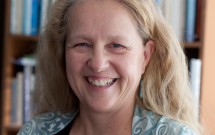By Awbrey Michelle Willett
Katherine Ninos, MA, LPCC, is Executive Vice President of Southwestern College and Director of the New Earth Institute. She received her BA in Psychology from Alfred University, New York, and her MA in Transformational Counseling and Education from Quimby College in its first graduating class. (Quimby College later became Southwestern College.) Katherine has been involved with every aspect of Southwestern College’s growth and development since 1980 and spoke of loving and caring for the school as one of her children during our interview. Katherine quickly identified self-care as self-love saying poignantly, “so much of it (self-care) is if I am treating myself as ‘the beloved’ or not?.” Katherine was my consciousness teacher, my vision quest guide, and is currently my academic advisor- all incredibly transformative experiences. Her words often resonate in my thoughts and heart like a mother’s voice and when I sit with her, I feel lovingly exposed.
Katherine described her self-love experience as, “dropping in with the intention of being available for guidance.” She spoke of the need to, “know how to not know” and a constant remembering that, “there are bigger forces at work.” She said, “there’s a humility to that, to keep surrendering my idea of things enough so that I can actually experience being in the flow of what spirit is trying to tell me, or of what I am trying to tell me.” Practically speaking, Katherine asks herself, “what’s useful and not useful? It helps one navigate all things: Diet, how I talk to myself, through awareness what my physical body needs, my emotional body, or my thoughts.” Known in the research as “self-efficacy,” the counselors’ confidence to exert control over their thinking, their behavior, and social environment, was found to play a role in protecting against compassion fatigue (Craig, 2010). Katherine seems to be suggesting that it is knowing how to let go, as well as having self-efficacy, agency that is guided by what’s useful, that supports her sense of direction with self-care.
Katherine didn’t see self-care as a moral dilemma. “I feel like therapy works to the degree to which love is present. How that works is sort of a mystery of healing, it’s not something that anybody does to another person. Maybe the ethical dilemma is that some people are easier to love than others.” When asked how she deals with this dilemma she said, “I have sat with it by taking it on as given to me by spirit, as a way to get past whatever is inside of me that blocks me from my own loving, rather than anything they have to do differently.” For Katherine self-love is about approaching our work through our heart intelligence. When we treat ourselves as the beloved, we are using our heart intelligence to remember that, “the oneness is always happening spiritually. We are individuals but on a spiritual level there’s the oneness even though we are unique and different from each other, and so there’s a place where anything that we do (we do to the other).” Katherine explained it well when she said, “The core of self-love is when I am present and brining a complete awareness of who I am as a spiritual being who is incarnated, so that I actually feel my total worth, my divinity, so I actually can experience reverence and love for the opportunity to be.” The research suggests that we may develop resilience (resource) through anything that makes us more aware and present.
References
Craig, C. D. (2010). Compassion satisfaction, compassion fatigue, and burnout in a national sample of trauma treatments therpists. Anxiety, Stress & Coping, 23(3), 319-339.
 Southwestern College Santa Fe, NM
Southwestern College Santa Fe, NM




